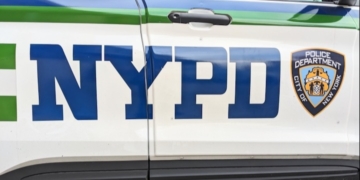
By Bob Tannenhauser
The New York City Rent Guidelines Board tonight, Tuesday, June 21, approved by a 5 to 4 vote, rent increases for rent-stabilized apartments of:
- 3.25% for one-year leases commencing on or after October 1, 2022 and on or before September 30, 2023, and
- 5% for two-year leases commencing on or after October 1, 2022 and on or before September 30, 2023.
Last year the Board approved no increases for the first six months of one-year leases commencing on or after September 30, 2021 and 1.5% for the second six months, and 2.5% for two-year leases commencing on or after September 30, 2021.
To view the meeting click here.









The setting looks like The Last Supper.
I suppose compromise is when everyone is unhappy. Property owners get another year of below-inflation increases, while tenants get a bigger increase in a decade.
The board believes almost 7% of units are operating at a loss. That number is sure to increase with another year of below-inflation increases. Which will lead property owners to warehouse more units, decreasing supply and increasing prices for the rest of us…
This system is a slow motion failure.
I have a hard time feeling bad for anyone considering my rent went up by $600
A month causing me to most likely move out of Manhattan after living here for 4 years.
As I go to a job everyday that I don’t enjoy to make enough money to barely cover my rent and bills…I feel bad for no one.
That seems reasonable to me. Prices are going up much more than that so renters are doing OK, but owners are getting something.
If the rules were tightened up a bit and there was more enforcement of the rules so that the person living in the rent stabilized apartment, making well north of six figures and owning a multi-million dollar vacation home was eliminated, the general population would be a lot more supportive. I know those people are very few and far between, but they are ruining it for a lot of other people.
You can thank democrats in Albany with their 2019 changes to rent laws for that. They ended luxury or high earner decontrol so even millionaires can keep their rent stabilized apartments.
https://www.cityandstateny.com/policy/2019/06/what-do-the-new-rent-regulations-mean-literally/177233/
There are tons of new “affordable” RS apartments were monthly rent is well north of $3k. Using 40x rent to income rule just do the sums….
As a rent stabilized teneant, I believe the rent increases this cycle were fair to both tenants and landlords. Of course I would prefer no increase at all, but lets face it, the cost of living is going up for everyone, and building ownership is not a charitable endeavor. Since the 2019 changes in the rent laws closed the ridiculous loopholes that allowed windfall profits for landlords (ie. Vacancy decontrol, overpriced capitol improvements, etc) the annual rent increases need to be adequate for building maintenance.
Having bureaucracies determine rent rather than the free market inevitably leads to distortions and inefficiencies. This is why NYC has perennial housing affordability problems.
That is a bogus argument, and always has been. In every city in which rent regulations have been abandoned or seriously weakened, overall rents have gone UP, not down. And by no coincidence, three of those cities – Los Angeles, San Francisco and Boston – have among the fastest-increasing homeless populations. Nice try.
Boston’s homeless population has decrease actually.
https://thebostonsun.com/2022/06/23/wu-announces-results-of-the-2022-homelessness-census/#:~:text=Overall%2C%20the%20number%20of%20individuals,to%201%2C545%20individuals%20in%202022.
LA and SF like much of California and in common with NYC simply have not built enough housing, Marry rent regulation with scarcity of supply and you get high rents.
Rent regulated tenants cannot be touched and generally do not move. Meanwhile developers or anyone else cannot or will not build new housing supply.
Have you walked down Broadway lately and seen how the free market works regarding commercial real estate? Bank, empty unit. nail salon, empty unit, drug store.
Free market doesn’t really work when there are wild imbalances caused by outside actors flooding the market with money that isn’t being produced in the market. Think private equity. If NYC was a closed market where people were only spending money they made inside NYC, it would be possible to let the system balance itself. But in this case, and in the case of a more and more global economy, allowing unregulated rental market would most likely block out most NYC workers from actually living in the city.
City and state should be glad of all that “outside actors flooding market with money”. Without such funds nearly nil new multi-family housing would be built.
Taxpayer funds be it state, local or federal alone or in combination cannot match private sector.
I agree Otis. Economics 101 will teach you that supply and demand will ultimately create the fairest market. I feel little sympathy, as my rent was increased 16% and I have always paid market rates in the last 12 years of living in NYC. I am not wealthy enough to subsidize rent-controlled apartment tenants, and that is essentially what happens, as landlords need to pay market rates for maintenance and specific property taxes.
“I am not wealthy enough to subsidize rent-controlled apartment tenants, and that is essentially what happens, as landlords need to pay market rates for maintenance and specific property taxes.”
No that’s no essentially what you’re doing. Furthermore, it’s telling that you used the term “rent control”.
Oh, come on. And the reason everywhere else, which doesn’t have rent control, has ever-worsening housing affordability problems?
Caping for landlords is so embarrassing.
What would happen to rents if supply were allowed to increase? It is next to impossible to build rental housing in NYC.
If Massachusetts is any guide (rent control was ended in 1194 by popular vote), initially rents increased, but also did new construction. Overall quality of rental housing on average increase also as owners put money into their properties.
https://boston.curbed.com/2019/11/14/20962932/massachusetts-rent-control-debate-tenants#:~:text=Rent%20control%20took%20apartments%20out,would%20drop%20as%20supply%20increased.
https://www.wbur.org/news/2022/01/12/rent-control-supporters-opponents-take-fight-to-beacon-hill
Important thing to remember is rent control or stabilization largely benefits such apartments in Manhattan (below Harlem), and parts of north west Brooklyn and some areas of Queens. Nearly everywhere else in NYC legal RS rent is higher than market rate.
New York’s affordability problems are massively worse than basically the rest of the country and have been for far longer than other parts of the country. Our magnitude of challenge is common in rent-regulated housing markets.
Link please.
Not wholly true. San Francisco for a start has same or worse housing “affordability” issues. Not surprisingly they also have rent control as well.
https://www.sfchronicle.com/sf/article/sf-rent-control-17193991.php
San Francisco has a not adding apartments problem, one NYC doesn’t have.
New housing starts actually decreased in 2021 just as they did in 2020.
https://rentguidelinesboard.cityofnewyork.us/wp-content/uploads/2021/06/2021-HSR.pdf
B.B.
What’s different about 2020 and 2021?
Read linked report, it’s all there….
our landlord does nothing to improve this building…owns many buildings and reeps rewards of increases of overpriced apartments here in Manhattan…Seems criminal what they claim as needing the increase and how they DONT spend it on cracked building..and rat infested garbage he does not clean up after
…Makes me furious.
I don’t mind more civil lanlords getting their raises but NOT all landlords are civil or law obiding!! Our landlord does NOT deserve this rent hike whatsoever
Your landlord is breaking a number of laws.
Document the failures, and make complaints.
Do not complain about seeing one rat. Do not complain about cracks in plaster/drywall. Complain about cracks on the outside of building and rat infestations.
Yes, I know that last year the Dept of Buildings made making complaints very hard, and 311 is next to useless for building complaints.
“Do not complain about seeing one rat”
??????????????
If your building is rent regulated then the landlord has very little incentive to properly maintain the building as tenants will never leave no matter what the condition of the building is.
Sometimes in life you get what you pay for.
Incentive has nothing to do with it-it’s the law.
“If your building is rent regulated then the landlord has very little incentive to properly maintain the building as tenants will never leave no matter what the condition of the building is.”
That’s not how the law works. Please do some reading up on it before posting.
We are in the midst of an inflation crisis. One of the most effective tools in curbing inflation is price controls. The government should employ that tool now whenever possible, especially for something as important as housing costs.
NYS got rent control and later stabilization due to WWII price controls. That was 70 years ago and both state and city haven’t stopped “controlling” rental market .
By definition insanity is doing the same thing over and over, but expecting a different outcome.
Every sane economist past and now agrees; price controls are fine in certain situations if they don’t go on too long. Otherwise such government intervention causes huge distortions in market.
B.B.
No, rent control dates to the 1920s.
NYS enacted emergency rent laws in 1920, they were largely repealed by middle of decade and totally gone by 1929.
State did not take up rent control again until WWII (1943) when Roosevelt enacted federal price controls in response to war effort.
https://en.wikipedia.org/wiki/Rent_control_in_New_York#:~:text=New%20York%20City%20and%20the,regulated%20rents%20to%20rise%20nationally.
Re: “End Fossil Fuels Now”
And replace them with WHAT?? OH, sorry, replace them with an “EV”, right?
But, according to an NBC-News report, the average price for an EV in February was $60,054 and the average price for an ordinary vehicle was $45,596: a difference of $14,458 !!
Also, a rechargeable EV is okay for a private home-with-garage, where it can be easily charged overnight. What about we who live in apartments? How many street-recharge stations are there in NYC, and where would vehicles line-up awaiting their turn?
And…what about Fire Engines, Sanitation trucks, snow-plows, etc.
“And replace them with WHAT?? OH, sorry, replace them with an “EV”, right?”
There’s ample evidence going tack to at least the 1930s that water can fuel cars.
Go down the rabbit hole.
Here are some more problems with EVs:
Electric cars, as they are now being sold/produced, are wasteful, dangerous, Teslas are especially dangerous, and involve significant continuing use of “fossil fuels” to charge them.
They also don’t have good range in weather below 20 degrees Fahrenheit.
And, no they can’t be quickly recharged at home. Even fast chargers, which require industrial service, take more than an hour to fill up a battery down at 15%.
Nixon did it in 1971 or ’72. That’s something Pres. Gonna-do could try.
While common perception is of well off white persons living in “cheap” rent controlled or stabilized apartments, like everything else demographic changes in NYC also are affecting rent regulated housing.
As per last US census report increasingly rent regulated housing is occupied by minorities. Within all numbers a good amount of RS or RC tenants are low income. That is even by benefitting from rent regulation laws, they are moderately to severely rent burdened.
Those people you see going through trash bags in front of UWS shops or supermarkets are not always automatically homeless. But rather those on limited incomes trying to make ends meet best way they can. Rent must be paid or eviction will follow regulated unit or not. So people must find ways to live on what they have left after housing payments.
https://en.wikipedia.org/wiki/Rent_control_in_New_York#:~:text=New%20York%20City%20and%20the,regulated%20rents%20to%20rise%20nationally.
Previous post had incorrect link.
https://www1.nyc.gov/assets/hpd/downloads/pdfs/services/2021-nychvs-selected-initial-findings.pdf